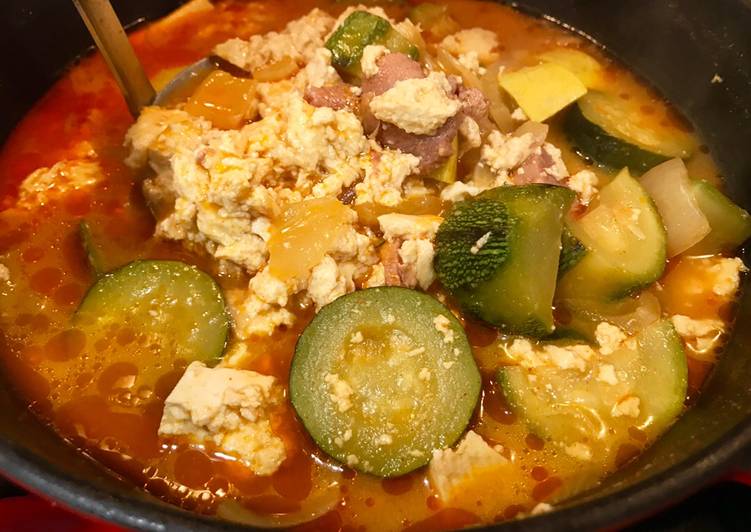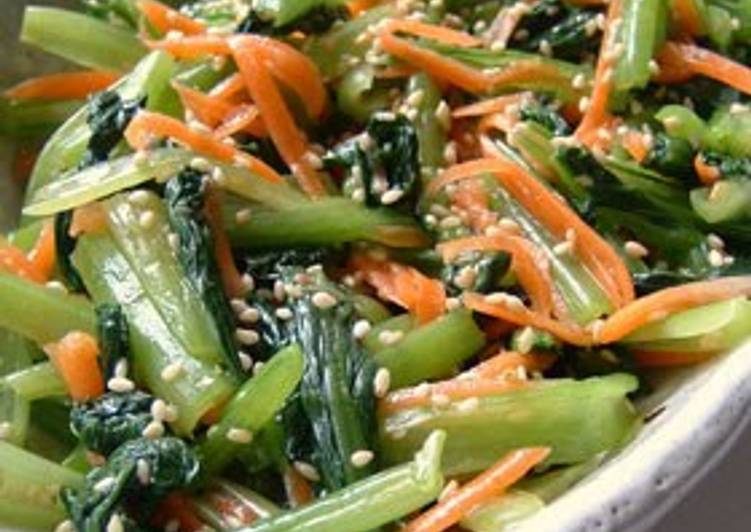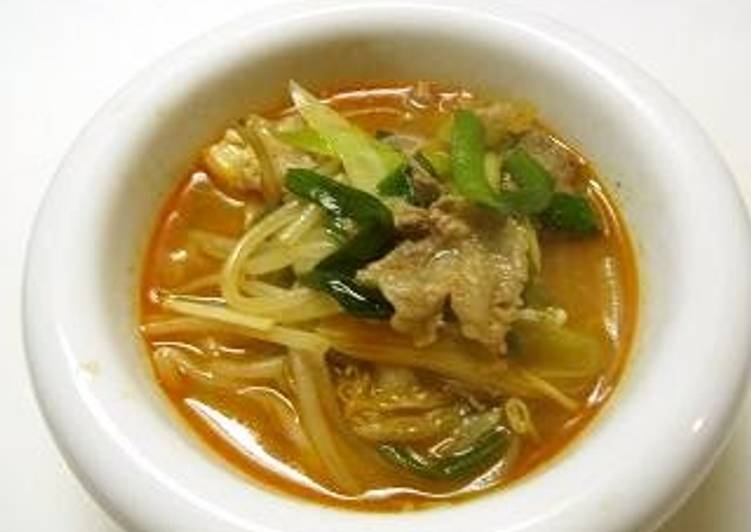
Hey everyone, I hope you are having an amazing day today. Today, I’m gonna show you how to prepare a distinctive dish, spicy hobak jjigae (korean squash stew) with pork & tofu. It is one of my favorites. This time, I’m gonna make it a little bit tasty. This is gonna smell and look delicious.
Gochujang Jjigae (Gochujang Stew with Zucchini). Gochujang adds lots of spicy, robust flavors to this simple stew made with summer zucchini and potatoes. Other times, we also love pork for a rich, meaty stew.
Spicy Hobak Jjigae (Korean Squash Stew) with Pork & Tofu is one of the most popular of recent trending foods on earth. It is appreciated by millions every day. It’s easy, it’s quick, it tastes yummy. Spicy Hobak Jjigae (Korean Squash Stew) with Pork & Tofu is something which I have loved my entire life. They’re nice and they look fantastic.
To get started with this recipe, we have to first prepare a few components. You can cook spicy hobak jjigae (korean squash stew) with pork & tofu using 9 ingredients and 5 steps. Here is how you can achieve it.
The ingredients needed to make Spicy Hobak Jjigae (Korean Squash Stew) with Pork & Tofu:
- Make ready 1/2 onion, diced
- Prepare 1-2 jalapeños, cut into 1/8" thick slices
- Prepare 2-4 garlic cloves peeled and smashed (or chopped)
- Make ready 1/2 pound pork shoulder, thinly sliced
- Prepare 1/4 cup dwenjang (Korean soybean paste) OR miso (which is the Japanese version)
- Get 1/4 cup gochujang (Korean chili paste)
- Make ready 4 cups water
- Take 4 cups calabacita squash or zucchini, cut into 1/2" thick slices (about 2 to 3 medium squashes)
- Get 1 (14 oz.) package tofu (can be any firmness)
Sundubu Jjigae is Korean stew made with soft (uncurdled) tofu. As you can imagine, the tofu texture is silky soft and because of that, this tofu is also a In general, the stew is spicy. It can potentially make you sneeze while you're cooking and may even tickle your throat. This Korean pork stew is a riff on kimchi jjigae.
Instructions to make Spicy Hobak Jjigae (Korean Squash Stew) with Pork & Tofu:
- Put all ingredients except squash and tofu in a pot, cover, turn the heat to medium high, and cook for 15 minutes.
- Give the jjigae a few good stirs. You'll see the jjigae change color as the dwenjang and gochujang dissolve into the broth. Let the jjigae continue cooking uncovered for 2 to 3 minutes until it comes to a boil.
- Add squash, give it a few good stirs, and cook another 15 minutes covered.
- Crumble tofu into the jjigae. (This is not typical - usually it's cut into cubes or slices - but I like it this way because the tofu picks up more flavor from the broth.) Cover and cook another 10 minutes. - - Don't worry that the broth is constantly boiling rather than simmering. Jjigae gets its well developed pungency from this constant application of higher heat and the resulting compounding, melding, and reduction of flavors.
- At this point, give everything another good stir and see if you need to adjust the seasoning. If it tastes fine, you're done. - - If a little too salty, add a touch of water. If you want more saltiness, you can add a little more dwenjang and/or gochujang, remembering that the gochujang is much hotter (as in spicy) than the dwenjang. - - If you do adjust the seasoning, let it boil another 4 or 5 minutes to let the new level of seasoning meld. - - That's it. Enjoy!
It's a salty, spicy, porky bowl of cabbage and broth goodness. And it's fast and easy to make. I took the Korean fish stock out of the recipe. No pulling the guts out of dried anchovies here. Just some simple chicken stock instead.
So that is going to wrap it up with this special food spicy hobak jjigae (korean squash stew) with pork & tofu recipe. Thanks so much for your time. I’m sure that you will make this at home. There’s gonna be interesting food at home recipes coming up. Remember to bookmark this page on your browser, and share it to your family, friends and colleague. Thank you for reading. Go on get cooking!


